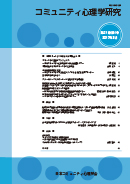Volume 19, Issue 2
Displaying 1-11 of 11 articles from this issue
- |<
- <
- 1
- >
- >|
Special Article
-
2016Volume 19Issue 2 Pages 127-129
Published: February 29, 2016
Released on J-STAGE: April 13, 2019
Download PDF (410K) -
2016Volume 19Issue 2 Pages 130-134
Published: February 29, 2016
Released on J-STAGE: April 13, 2019
Download PDF (666K) -
2016Volume 19Issue 2 Pages 135-139
Published: February 29, 2016
Released on J-STAGE: April 13, 2019
Download PDF (626K) -
2016Volume 19Issue 2 Pages 140-146
Published: February 29, 2016
Released on J-STAGE: April 13, 2019
Download PDF (1149K) -
2016Volume 19Issue 2 Pages 147-151
Published: February 29, 2016
Released on J-STAGE: April 13, 2019
Download PDF (685K) -
2016Volume 19Issue 2 Pages 152-157
Published: February 29, 2016
Released on J-STAGE: April 13, 2019
Download PDF (758K)
The 18th Annual Conference of Japanese Society of Community Psychology: Roundtable
-
2016Volume 19Issue 2 Pages 158-175
Published: February 29, 2016
Released on J-STAGE: April 13, 2019
Download PDF (2539K)
Original Article
-
2016Volume 19Issue 2 Pages 176-195
Published: February 29, 2016
Released on J-STAGE: April 13, 2019
Download PDF (2812K) -
2016Volume 19Issue 2 Pages 196-212
Published: February 29, 2016
Released on J-STAGE: April 13, 2019
Download PDF (2499K)
Academic Essay
-
2016Volume 19Issue 2 Pages 213-217
Published: February 29, 2016
Released on J-STAGE: April 13, 2019
Download PDF (701K)
Condolatory news
-
2016Volume 19Issue 2 Pages 218-221
Published: February 29, 2016
Released on J-STAGE: April 13, 2019
Download PDF (450K)
- |<
- <
- 1
- >
- >|
